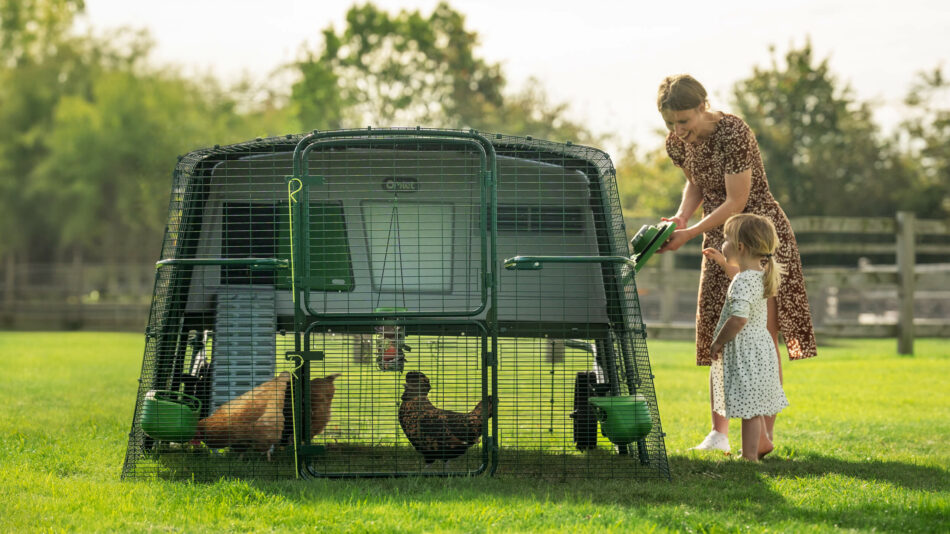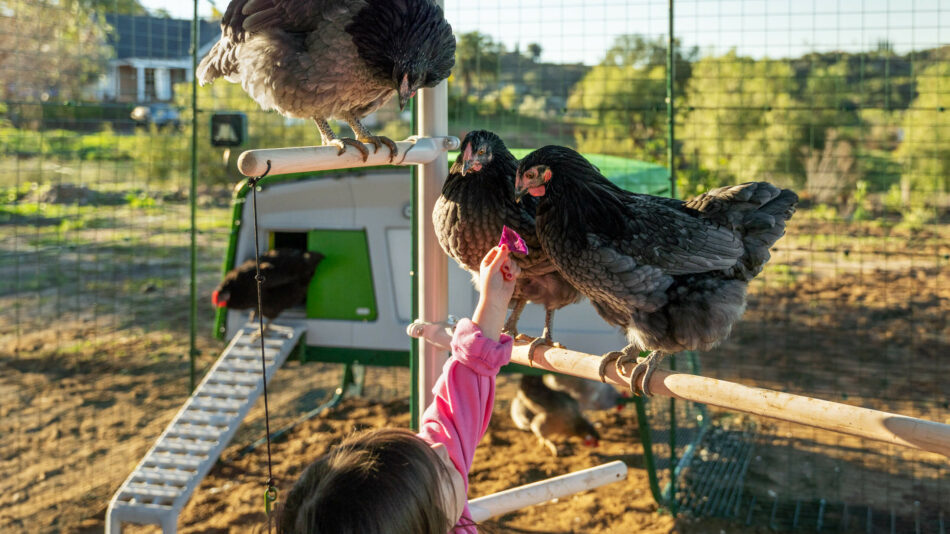Can I train my chickens?
Chickens are more than just the pet that lays breakfast. They’re curious, special and surprisingly intelligent, which is why many keepers wonder: Can I train my chickens? With some patience, consistency, and the right approach, chickens can learn tricks, routines, and even respond to recall just like more traditional household pets.
Can chickens be trained?
Chickens are smart and have excellent memories. They can recognise the faces of humans and fellow flock members, remember locations of food, and even solve simple puzzles. But their training is less about domination and more about communication. Using positive reinforcement, treats, and repetition, chickens quickly learn to associate cues with actions — and thrive on the mental stimulation they provide. Here are some of the things you can teach your chickens.
Come when called (recall)
One of the most practical skills is teaching chickens to come when called. By using a specific sound, like a whistle or a cluck, and rewarding them with treats, your hens will soon flock to you in anticipation of food. This is particularly helpful when needing to call your chickens in from free ranging.
Return to the coop
Chickens can learn routines, like returning to their coop at night. Some of this is a natural instinct to roost, but with tools like an Autodoor and Coop Light, your chickens will quickly learn where their bed is, and when to head there. Training your chickens to roost at specific times will help keep them safe from chicken predators and make evening round ups easier.
Obstacle courses and tricks
Some chickens enjoy obstacle courses or “tricks” for enrichment. Jumping over low barriers, walking through tunnels, or navigating mini agility courses can give chickens vital mental stimulation. You can make your own temporary obstacle courses from boxes or repurposed materials, or use a Freestanding Chicken Perch or Chicken Swing for more durable elements.
Target training
Using a stick pointer, chickens can learn to touch or follow a target. This skill is a foundation for more advanced tricks and can also help with handling and chicken health checks. It’s an impressive feat to show your friends, while serving practical purposes.
How to train your chickens: step-by-step
Step 1: create positive associations
Begin by identifying your chickens’ favourite treats, like mealworms, sunflower seeds, or small pieces of fruit. Use these exclusively during training to make the connection clear. This will make your hen eagerly anticipate training sessions and keep their attention throughout.
Step 2: start small
Focus on one skill at a time. For example, if you’re teaching your chickens to come when called, practice only calling them across a cohort distance at first. Patience is key, and short, frequent sessions work better than long, infrequent ones. Start off with 5-10 minutes of training daily and gradually increase over time.
Step 3: use clear cues
Use the same verbal cue, hand signal, or whistle every time. Consistency helps your chickens understand exactly what you want from them. And, by keeping the same cues, it’s easier to teach the same tricks to multiple flock members.
Step 4: reward immediately
The reward should follow the desired behaviour instantly. Chickens are quick learners, but they need to make the connection between action and reward. Positive reinforcement is the fastest way to your hens’ hearts.
Step 5: repeat and expand
Once a chicken has mastered a skill, gradually increase the challenge. Extend recall distances, add mild obstacles, or introduce distractions. Keep sessions fun and positive, and your flock will continue to improve.
The intelligence of chickens
It’s easy to underestimate chickens, but studies have shown they possess cognitive abilities comparable to some mammals. Chickens can:
- Recognise over 100 individual faces, both human and avian.
- Solve simple puzzles and understand cause-and-effect.
- Plan for the future, like hiding food for later consumption.
- Learn from observation, taking lessons from each other.
Understanding their intelligence not only makes training possible but also highlights why enrichment is so important. Mental stimulation keeps chickens happy, healthy, and less prone to boredom-related behaviours.
Why training is useful for chicken keepers
Training chickens is beneficial for birds and keepers alike. It keeps your flock safe and engaged while simplifying your routine and creating deeper bonds. Having your chickens come when they’re called, engaging in activities with them, and providing them with enrichment supports healthy, happy flocks (and raisers). With plenty of patience and positive reinforcement, training chickens is not only possible — it’s rewarding.
Omlet and your flock
At Omlet, we believe that enrichment is important, but shouldn’t be complicated. Our chicken products support the natural behaviours of flocks while being mindful of your workload. Our chicken coops, chicken runs, and chicken perches are the foundation for setups that work with you and your hens to make every day a rewarding one with your flock.
This entry was posted in Chickens


